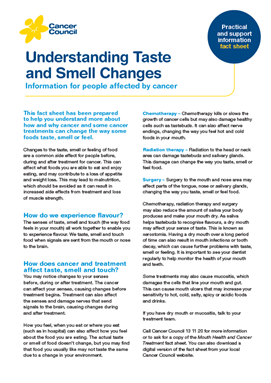- Home
- Cancer Information
- Managing side effects
- Taste and smell changes
- How long do changes last?
How long do changes last?
It’s common to have changes in taste during treatment and for a short time afterwards. It may take several months for your sense of taste to return to normal. In some cases, taste changes may be permanent. Most changes will get better with time, but this depends on what type of treatment you have and where the cancer is in your body. Your doctor will be able to tell you how long your senses are likely to be affected.
If you have chemotherapy, you might notice that symptoms change during the course of a single treatment cycle. For example, flavour problems are usually worse in the first week after chemotherapy and then gradually improve. Studies have shown that people who only have chemotherapy treatment start to taste and enjoy food two months after treatment has ended.
Radiation therapy or surgery to the head or neck area can damage the salivary glands, and you may continue to experience problems for some time.
The importance of nutrition
Nutrition is the food and drink you need for your health and wellbeing. Good nutrition is important for people who have cancer as this will help you recover more quickly from treatment and continue your life in the best possible way.
Changes to your enjoyment of food may lead you to eat and drink less and to lose weight, which may cause malnutrition. If you are eating and drinking less, ask your doctor or nurse for a referral to see a nutrition specialist, called a dietitian, who can help you to find ways to enjoy food and meet your nutrition needs.
For more on this, call Cancer Council 13 11 20 or see Nutrition and cancer.
Listen to our podcast on Appetite Loss and Nausea
More resources
-
Living Well After Cancer Download PDF613kB
-
Understanding Chemotherapy Download PDF673kB
-
Understanding Radiation Therapy Download PDF673kB
-
Understanding Surgery Download PDF541kB
-
Living Well After Cancer ebook Download ePUB
-
Understanding Chemotherapy ebook Download ePUB
-
Understanding Radiation Therapy ebook Download ePUB
-
Understanding Surgery ebook Download ePUB
Emma McKie, Clinical Dietitian, Peter MacCallum Cancer Centre, VIC; Cecilia Barling, Consumer; Dawn Bedwell 13 11 20 Consultant, Cancer Council Queensland, QLD; Gillian Blanchard, Oncology Nurse Practitioner, Calvary Mater Newcastle, NSW; Dr Karen Taylor, Radiation Oncologist, GenesisCare Radiation Oncology, VIC.
View the Cancer Council NSW editorial policy.
View all publications or call 13 11 20 for free printed copies.
Need to talk?
Support services
Coping with cancer?
Speak to a health professional or to someone who has been there, or find a support group or forum
Need legal and financial assistance?
Pro bono services, financial and legal assistance, and no interest loans
Cancer information
Learn more about chemotherapy
Chemotherapy is the use of drugs to kill or slow the growth of cancer cells
What is cancer?
How cancer starts and spreads
